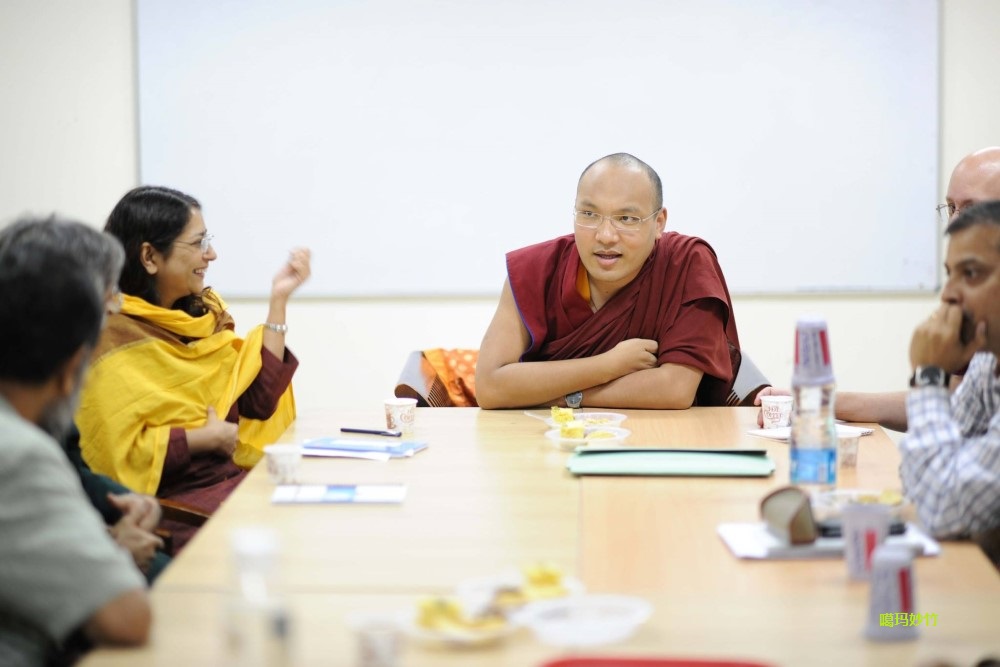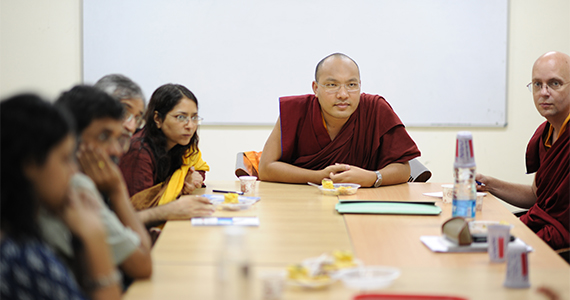法王新闻 | 2013年10月
『新德里』印度安贝卡大学演讲
『New Delhi』Speech at Ambedkar University Delhi

時間:2013年10月03日 3rd Oct., 2013
地點:印度 新德里 New Delhi, India
首次在印度主要大學發表演說
First Major Indian University Visit
His Holiness Ogyen Trinley Dorje, addressed students and faculty of the Ambedkar University Delhi on 3rd Oct on a range of topics relating to emotional wellbeing. After a brief opening address to the packed hall at the university’s Kashmere Gate campus, the Karmapa engaged in extended dialogue with MPhil students from a number of departments.
法王就情緒健康等相關主題,對安貝卡大學的師生發表演說。該校位喀什米爾門校區的演講會場座無虛席,簡短的開場白後,法王旋即與來自不同科系的哲學碩士班學生展開廣泛的對談。
This interaction at Ambedkar University Delhi marked the Karmapa’s first major visit to a university in India. Known for its commitment to social justice, Ambedkar University Delhi is the first university in the region dedicated entirely to postgraduate education and research in the social sciences and humanities.
此在德里安貝卡大學的交流,為法王首次對印度主要大學的訪問。安貝卡大學以支持社會公義而著稱,是當地傾力於學士後教育與人文社會科學研究的第一所大學。

Describing the ideal spiritual practitioner, or bodhisattva, as “an activist working solely for others”, the Karmapa explored the responsibility we have to care for others with whom we share the global village. He particularly addressed the way that clinging to our identities can separate human beings and impede the development of love and compassion. “When we cease to see ourselves as separate, we do not disappear, but rather we see ourselves as part of others,” the Karmapa said. Otherwise, as long as we hold to our separate identities, divisions and selfishness inevitably arise and love cannot flourish, he said.
法王將理想的修行者―—菩薩,描述為「惟求利他的行動主義者」,並且探討對於和我們共享地球村的其他眾生,我們應該承擔的關懷與照顧。法王特別說明對於自我感的執著,如何造成人與人的隔閡以及對開展慈悲的障礙:「當不再視自己與他人隔離時,我們並不會消失,反而會將自己視為是他人的一部份。」
“Compassionate action must not be treated as a business,” the Karmapa told the students. “Rather, it can be seen as a creative, rather than a commercial, undertaking. Our compassion can be something that beautifies the world, rather than something we do in hopes of gaining something for ourselves.”
法王表示,只要我們執著於隔離的自我感,就無法避免派別分化與自私,那麼慈愛將無法開顯。「慈悲的行動絕不能被當成是一種買賣,而應該視它為一項具有創意的承擔。慈悲不是為求自利,而是我們獻給世界的莊嚴。」
Halfway into the interaction with the students, the Karmapa particularly invited women to participate fully in the discussion, observing that only male students and no women had asked questions up to that point.
演講會進行到一半,法王注意到目前只有男學生發問,因此特別邀請女士們鼓起勇氣加入討論。
His Holiness’ address was delivered at the invitation of the Department of Psychology, with students from the development practices, education, human ecology, psychology and sociology departments also participating. Professor Dr. Honey Oberoi Vahali, Dean of the School of Human Studies, commented that the interaction with the Karmapa was the most lively she had ever seen in that hall.
此演講會由心理系主辦,但前來聽講的學生除了心理系外,還包括發展實務學、教育學、人類生態學、社會學等科系的學生。人類學院院長翰妮.歐貝洛依.瓦哈里博士(Honey OberoiVahali)表示,這場與法王噶瑪巴的互動,是她在這座演講廳內見過最精彩活潑的討論。
At the conclusion of the event, Vice Chancellor Professor Shyam B. Menon commented that beneath the Karmapa’s “veneer of youth, light-heartedness and candour was profundity and depth.“
副校長殊亞.梅能(Shyam B. Menon)致結語時評論,法王噶瑪巴年輕、詼諧又坦誠的表相下,蘊涵的是深度與廣度。
The Vice Chancellor noted that the university generally restricts itself to matters of rational and empirical study and does not often address matters pertaining to spirituality and the self. He observed that these areas of human activity have too often been appropriated by zealots and sectarians. “We need to re-appropriate these two as resources and not allow these important aspects to become distorted,” the Vice Chancellor said.
副校長表示該校通常只著眼於理性與經驗性的研究,不太涉及精神修持和自我的相關領域。他觀察到人類的這些活動,往往是狂熱份子與教派分別者的屬地:「我們必須將此兩者重新徵收為資源,不容這些人類活動的重要層面受到扭曲。」
网页修改记录:2022年1月07日,此处新建基本网页,放置YOUTUBE视频链接;2024年5月31日,添加图片、中英文本。
Youtube 视频
